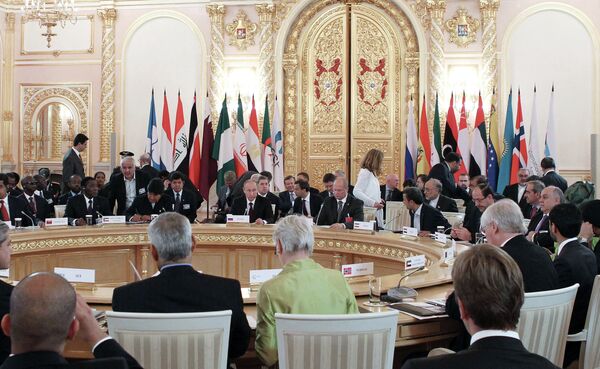MOSCOW, July 1 (RIA Novosti) – Gas exporting countries should focus on decreasing price volatility and ensuring long-term supply stability, Russian President Vladimir Putin said during a major gas summit in Moscow on Monday.
“The forum’s key task is to develop a consolidated position on pricing, create conditions for reducing excessive price volatility and increase the sector’s transparency, which should contribute to gas transport infrastructure development and more reliable [gas] deliveries,” Putin said during a session at the forum’s second summit that opened in Moscow on Monday.
The Gas Exporting Countries Forum (GECF) functions like a gas equivalent of the oil cartel OPEC. Founded in Tehran in 2001, it controls over 70 percent of the world's natural gas reserves and over 80 percent of liquefied natural gas production.
It currently comprises Algeria, Bolivia, Venezuela, Egypt, Iran, Qatar, Libya, Nigeria, Russia, Equatorial Guinea, Trinidad and Tobago, Oman and the United Arab Emirates.
Putin stressed the importance of long-term supply stability to gas exporting countries, and added that the global demand for natural gas already outstrips that for oil.
According to International Energy Agency figures, this market is expected to grow by more than 16 percent by 2018 to reach 4 trillion cubic meters each year.
“This offers big opportunities for gas producers and means a serious responsibility for all of us, especially given the complex global economic situation,” Putin said, adding that forum’s member countries hold two thirds of the world’s proven gas reserves and almost half of all global gas exports.
Putin slammed attempts to move away from long-term gas contracts and adopt volatile spot prices, saying that this “would lead to serious costs and, in the long run, undermine importing countries’ energy security.”
Some European energy companies, such as Italy's Edison, Germany's RWE and E.ON, Poland’s PGNiG's, appealed to the Stockholm Arbitration Tribunal in 2011 for a ruling on gas price discounts and a switch to spot prices for gas, which were far below the gas prices set in Gazprom’s long-term contracts at that time.
Gazprom cut gas prices for long-term contracts with European energy firms from early 2012, bringing them in line with trends on spot markets.
The introduction of the third energy package limits the EU’s traditional gas suppliers, which have invested for decades in the development of Europe’s gas transportation system, Putin said.
Calling for greater unity among gas exporters as a “more efficient” way of “resisting illegitimate pressure” and safeguarding the interests of gas producers and suppliers alike, Putin said.
The EU’s Third Package for Electricity and Gas markets aims to separate production and supply from transmission networks, facilitate the cross-border trade in energy, increase national regulators’ effectiveness, and also promote cross-border collaboration and investment, greater market transparency on network operation and supply, in addition to greater solidarity among EU countries.
If implemented, it would have implications for vertically-integrated state energy companies such as Russia's Gazprom.


